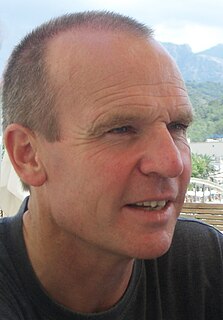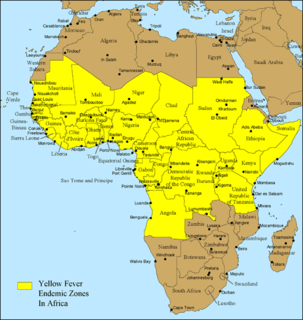
The Uganda Virus Research Institute (UVRI) is a medical research institute owned by the Uganda government that carries out research on communicable diseases in man and animals, with emphasis on viral transmitted infections. UVRI is a component of Uganda National Health Research Organization (UNHRO), an umbrella organization for health research within Uganda.
The o'nyong'nyong virus (ONNV) was first isolated by researchers at the Uganda Virus Research Institute in Entebbe, Uganda, during a large outbreak of a disease in 1959 that resembled dengue fever. ONNV is a togavirus, genus Alphavirus, is closely related to the chikungunya and Igbo Ora viruses, and is a member of the Semliki Forest antigenic complex. The name was given to the disease by the Acholi tribe during the 1959 outbreak. The name comes from the Nilotic language of Uganda and Sudan and means “weakening of the joints". The virus can infect humans and may cause disease.
The Royal Society of Tropical Medicine and Hygiene, more commonly known by its acronym RSTMH, was founded in 1907 by Sir James Cantlie and George Carmichael Low. Sir Patrick Manson, the Society's first President (1907–1909), was recognised as "the father of tropical medicine" by his biographer. He passed the post on to Sir Ronald Ross, discoverer of the role of mosquitoes in the transmission of malaria.

Christopher Dye FRS, FMedSci is a British biologist, epidemiologist and public health specialist. He is Professor of Epidemiology at the University of Oxford and formerly Director of Strategy at the World Health Organization.

Zika fever, also known as Zika virus disease or simply Zika, is an infectious disease caused by the Zika virus. Most cases have no symptoms, but when present they are usually mild and can resemble dengue fever. Symptoms may include fever, red eyes, joint pain, headache, and a maculopapular rash. Symptoms generally last less than seven days. It has not caused any reported deaths during the initial infection. Mother-to-child transmission during pregnancy can cause microcephaly and other brain malformations in some babies. Infections in adults have been linked to Guillain–Barré syndrome (GBS).

Mosquito-borne diseases or mosquito-borne illnesses are diseases caused by bacteria, viruses or parasites transmitted by mosquitoes. Nearly 700 million people get a mosquito-borne illness each year resulting in over one million deaths.
The American Society of Tropical Medicine and Hygiene (ASTMH) is an Arlington, Virginia-based non-profit organization of scientists, clinicians, students and program professionals whose longstanding mission is to promote global health through the prevention and control of infectious and other diseases that disproportionately afflict the global poor. ASTMH members work in areas of research, health care and education that encompass laboratory science, international field studies, clinical care and country-wide programs of disease control. The current organization was formed in 1951 with the amalgamation of the American Society of Tropical Medicine, founded in 1903, and the National Malaria Society, founded in 1941.

Zika virus is a member of the virus family Flaviviridae. It is spread by daytime-active Aedes mosquitoes, such as A. aegypti and A. albopictus. Its name comes from the Ziika Forest of Uganda, where the virus was first isolated in 1947. Zika virus shares a genus with the dengue, yellow fever, Japanese encephalitis, and West Nile viruses. Since the 1950s, it has been known to occur within a narrow equatorial belt from Africa to Asia. From 2007 to 2016, the virus spread eastward, across the Pacific Ocean to the Americas, leading to the 2015–2016 Zika virus epidemic.
The Journal of Public Health is a quarterly peer-reviewed public health journal. It was originally established in 1892 as the Journal of State Medicine by the Royal Institute of Public Health and has undergone several renames during its history. It acquired its current name in 2004 and is currently published by Oxford University Press on behalf of the Faculty of Public Health. The editors-in-chief are Eugene Milne and Ted Schrecker.
International Health is a quarterly peer-reviewed public health journal covering all areas of global health. It was established in 2009 and is published by Oxford University Press on behalf of the Royal Society of Tropical Medicine and Hygiene. The editor-in-chief is Professor David Molyneux. According to the Journal Citation Reports, the journal has a 2018 impact factor of 1.797.

The ZikaForest is a tropical forest near Entebbe in Uganda. Ziika means "overgrown" in the Luganda language. As the property of the Uganda Virus Research Institute (UVRI) of Entebbe, it is protected and restricted to scientific research.

This article primarily covers the chronology of the 2015–16 Zika virus epidemic. Flag icons denote the first announcements of confirmed cases by the respective nation-states, their first deaths, and relevant sessions and announcements of the World Health Organization (WHO), and the U.S. Centers for Disease Control (CDC), as well as relevant virological, epidemiological, and entomological studies.
Prof Alexander John Haddow CMG FRS FRSE FRCPSG FRES. FRS CMG was a Scottish entomologist recognised for his work at the Uganda Virus Research Institute, including the discovery of the Zika virus, and research into the insect vectors of the yellow fever virus. Other notable work included relating the incidence of Burkitt's lymphoma to climatic conditions and the discovery of several previously unknown viruses in east Africa, particularly arboviruses.

John ("Jack") Payne Woodall (1935–2016) was a British/American entomologist and virologist who made significant contributions to the study of arboviruses in South America, the Caribbean and Africa. He did research on the causative agents of dengue fever, Crimean–Congo hemorrhagic fever, o'nyong'nyong fever, yellow fever, Zika fever, and others. He served as a staff member of the Rockefeller Foundation, and director of the Foundation's laboratory in Brazil, as a research fellow at the Yale Arbovirus Research Unit, was head of the Arbovirus Laboratory for the New York State Health Department, and worked for the Centers for Disease Control. Woodall spent 13 years at the World Health Organization developing and evaluating health programs. After retirement in 2007, he continued as a consultant and professor at the Institute of Medical Biochemistry in Rio de Janeiro, Brazil, where he had worked since 1998. In 1994, he cofounded the Program for Monitoring Emerging Diseases (ProMED-mail). Woodall's emails concluded with a quote from the Calvin and Hobbes cartoon, "God put me on this earth to accomplish a certain number of things. Right now I'm so far behind I will never die."
Adriano de Bernardi Schneider, best known as Adriano Schneider is a Brazilian researcher who has been involved in the fight against the Zika virus in the United States in the last epidemic in Brazil in 2015.

David Hurst Molyneux CMG is a British parasitologist who served as the Director of the Liverpool School of Tropical Medicine (1991–2000), where, as of 2018, he is an emeritus professor. He previously held the Chair of Biological Sciences at the University of Salford (1977–91), where he also served as Dean of the Faculty of Science. His research and advocacy have focused on what are now known as neglected tropical diseases, and Michael Barrett credits him as among the earliest advocates of the campaign to focus international attention on this group of diseases in the early-to-mid 2000s.

Annelies Wilder-Smith is a professor of infectious diseases research at the Lee Kong Chian School of medicine. She is a world-renowned expert in travel and Tropical medicine. She is the president of the International Society of Travel medicine (ISTM). She was the former president of the Asia Pacific Society of Travel medicine and she was also the former chair of the Regional ISTM Conference in Singapore.
Jordi Casals i Ariet was a Catalan physician and epidemiologist.

Scott Halstead is an American physician-scientist, virologist and epidemiologist known for his work in the fields of tropical medicine and vaccine development. He is considered one of the world's foremost authorities on viruses transmitted by mosquitoes, including Dengue, Japanese encephalitis, chikungunya and Zika. He was one of the first researchers to identify the phenomenon known as antibody-dependent enhancement (ADE), where the antibodies generated from a first dengue infection can sometimes worsen the symptoms from a second infection.
Rosemary Chepkorir Sang is a Kenyan virologist at the Kenya Medical Research Institute, who specialises in the transmission and treatment of arboviruses. She has a PhD in zoology and an MSc in medical virology and entomology. She has investigated several major outbreaks of arbovirus in East Africa. She has been outspoken on the need for African countries to be part of global policy discussions on climate change. During the COVID-19 pandemic she expressed concern about the welfare of street children. She has been a member of a number of Expert Committees for the World Health Organisation, including on International Health Regulation, and Rift Valley fever. She was elected a Fellow of the African Academy of Sciences in 2014.










